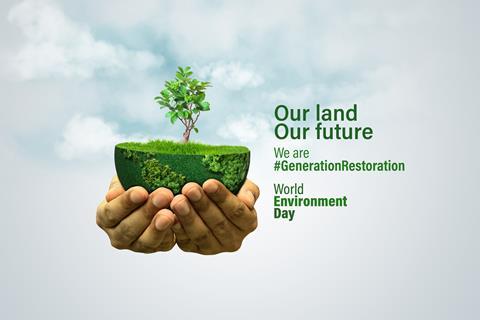This year’s World Environment Day puts the focus on land restoration, desertification and drought resilience, with the aim of accelerating progress on global commitments
Saudi Arabia is hosting this week’s World Environment Day, which has as its focus land restoration, desertification and drought resilience.

Up to 40 per cent of the world’s land is already degraded, directly affecting half the world’s population, while around 3.2bn are negatively impacted by desertification. By 2050, it is forecast that more than three-quarters of the global population will be affected by droughts.
“This World Environment Day aims to support accelerated progress on global commitments, which include protecting 30 per cent of land and sea for nature and restoring 30 per cent of the planet’s degraded ecosystems,” the United Nations Environment Programme (UNEP) stated. “While countries have promised to restore 1bn hectares of land by 2030, current trends suggest 1.5bn hectares would need to be restored to meet the 2030 land degradation neutrality goals.”
A high-level policy event took place in Riyadh on 5 June, with UNEP executive director Inger Andersen delivering a keynote speech.
“Through World Environment Day and through hosting the UN Convention to Combat Desertification’s conference of the parties this December, the Kingdom of Saudi Arabia can build momentum and action towards these restoration goals, slow climate change, protect nature and boost the livelihoods and food security of billions of people around the world,” said Andersen.

A record 3,657 World Environment Day events were registered this year, held by governments, cities, civil society, universities, schools and businesses, mobilising environmental actions like tree planting in the Maldives and Kenya to restore ecosystems around the world.
Saudi Arabia is acting nationally and regionally through the Saudi Green Initiative and the Middle East Green Initiative, and also globally through its presidency of the G20 and the adoption of the Global Land Restoration Initiative.
“By restoring ecosystems, we can slow the triple planetary crisis: the crisis of climate change, the crisis of nature and biodiversity loss, including desertification, and the crisis of pollution and waste,” said Andersen. “We can help to reverse biodiversity loss by 2030, in line with the Global Biodiversity Framework. And we can get closer to limiting global temperature rise in line with the Paris Agreement by increasing carbon storage, including in the peatlands. And we can reduce poverty and food insecurity, in line with the SDGs.”



